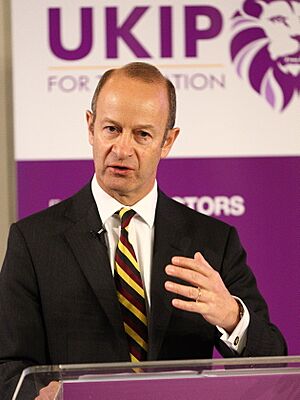2017 UK Independence Party leadership election facts for kids
The 2017 UK Independence Party leadership election was a special vote held on 29 September 2017. Members of the UK Independence Party (often called UKIP) chose who they wanted to be their new leader. Henry Bolton won this election. He received 30% of all the votes.
This election happened because UKIP did not do very well in the general election earlier that year. The party needed a new leader to help them move forward. Nigel Farage, a well-known figure in UKIP, decided not to run for the leadership this time.
Who Wanted to Be Leader?
Several people put their names forward to become the new leader of UKIP. Here are the main candidates:
- Henry Bolton: He used to work in the British Army and was also a police officer.
- Jane Collins: She was a UKIP member of the European Parliament (MEP). MEPs are elected to represent their country in the European Union.
- David Kurten: He was a UKIP member of the London Assembly. This group helps run the city of London.
- Aidan Powlesland
- John Rees-Evans
- Anne Marie Waters: An activist.
- Peter Whittle: He was the Deputy Leader of UKIP at the time.
How the Votes Turned Out
Here are the results of the election, showing how many votes each candidate received:
| Pos. | Candidate | Votes | % | |
|---|---|---|---|---|
| 1 | Henry Bolton | 3,874 | 30.00% | |
| 2 | Anne Marie Waters | 2,755 | 21.33% | |
| 3 | David Kurten | 2,201 | 17.04% | |
| 4 | John Rees-Evans | 2,021 | 15.65% | |
| 5 | Peter Whittle | 1,413 | 10.94% | |
| 6 | Jane Collins | 566 | 4.38% | |
| 7 | Aidan Powlesland | 85 | 0.66% | |
| Total | 12,915 | 100% | ||
What Happened Next
After winning, Henry Bolton said his victory helped UKIP avoid becoming a party with extreme views. Anne Marie Waters left UKIP in October and started her own political party called For Britain. John Rees-Evans also left UKIP and created his own party, named Affinity.
 | Jewel Prestage |
 | Ella Baker |
 | Fannie Lou Hamer |


